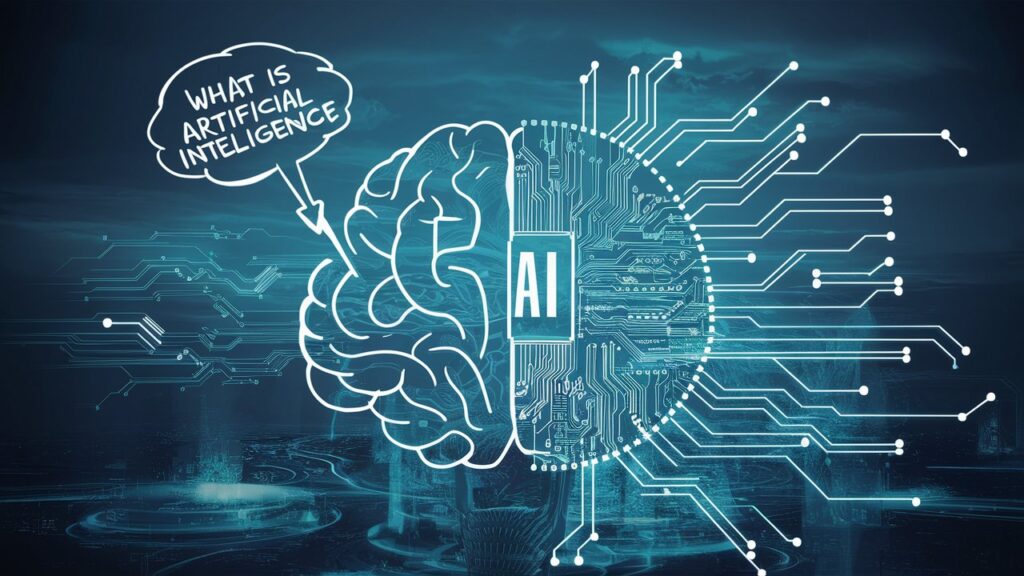
A Comprehensive Guide
Artificial Intelligence (AI) is one of our era’s most transformative technologies. It empowers machines to perform tasks that, until recently, were considered exclusive to human intelligence. From recognizing speech and translating languages to analyzing vast amounts of data and making sophisticated recommendations, AI is reshaping how we interact with technology. This article delves into the essence of artificial intelligence, exploring its capabilities, applications, and impact on various sectors.
What is Artificial Intelligence?
At its core, Artificial Intelligence refers to the capability of a digital computer or a robot controlled by a computer to perform tasks typically associated with intelligent beings. These include problem-solving, learning from experiences, and making decisions. AI encompasses various technologies, including machine learning, natural language processing, and robotics, each contributing to its expansive potential.

The Building Blocks of AI
AI technology is founded on several key components:
- Machine Learning (ML): This subset of AI involves algorithms that allow computers to learn from and make predictions or decisions based on data. ML algorithms improve their performance over time without being explicitly programmed.
- Natural Language Processing (NLP): NLP enables machines to understand and respond to human language meaningfully and helpfully. This technology powers applications like chatbots and translation services.
- Robotics: Robotics combines AI with mechanical engineering to create machines capable of performing tasks autonomously. From manufacturing robots to autonomous vehicles, robotics exemplifies AI’s physical applications.

How Does Artificial Intelligence Work?
AI systems operate through data, algorithms, and computing power. The process generally involves the following steps:
- Data Collection: AI systems require vast amounts of data to function effectively. This data serves as the foundation for training and refining algorithms.
- Training: AI algorithms are exposed to large datasets during the training phase. The system learns patterns, correlations, and features within the data, enhancing its ability to perform specific tasks.
- Testing and Validation: The AI system is tested with new data to ensure it performs accurately and reliably after training. This phase helps identify any issues and fine-tune the system.
- Deployment: Once validated, the AI system is deployed in real-world scenarios where it performs tasks such as analyzing customer behavior, automating processes, or providing personalized recommendations.

Applications of Artificial Intelligence
Artificial Intelligence has a vast array of applications that span numerous fields:
- Healthcare: AI is revolutionizing healthcare through predictive analytics, personalized medicine, and advanced diagnostic tools. It assists in detecting diseases early, recommending treatments, and even managing patient care.
- Finance: In the financial sector, AI is used for fraud detection, risk management, and algorithmic trading. It helps banks and financial institutions to process transactions faster and more securely.
- Retail: AI enhances the shopping experience by providing personalized recommendations, managing inventory, and optimizing supply chains. It helps retailers understand consumer preferences and predict trends.
- Education: AI tools support customized learning experiences, automate administrative tasks, and provide real-time feedback to students. These advancements contribute to a more effective educational environment.
- Transportation: Autonomous vehicles and intelligent traffic management systems are prominent examples of AI in transportation. These technologies aim to improve safety, efficiency, and convenience in travel.

The Ethical Implications of AI
As with any transformative technology, Artificial Intelligence brings about ethical considerations:
- Privacy: AI systems often require access to personal data. Ensuring this data is handled responsibly and securely is crucial to maintaining user trust.
- Bias: AI algorithms can inadvertently perpetuate biases present in the training data. Addressing and mitigating these biases is essential to ensure fair and equitable outcomes.
- Job Displacement: Automating tasks may lead to job displacement in specific sectors. Balancing the benefits of AI with its impact on employment is an ongoing challenge.

The Future of Artificial Intelligence
The future of AI holds immense promise. Continued technological advancements will likely lead to more sophisticated and capable AI systems. We can anticipate further integration of AI into everyday life, driving innovation and efficiency across various domains. However, navigating the associated challenges thoughtfully and responsibly will be vital.
Also Read: Exploring Revo Technologies Murray Utah

Conclusion
Artificial Intelligence is a technological marvel and a profound shift in how we interact with the world. Its ability to perform tasks traditionally associated with human intelligence is transforming industries and shaping the future. As AI continues to evolve, it is essential to harness its potential while addressing ethical and societal implications. Embracing this technology responsibly will ensure its benefits are maximized and its challenges managed effectively.

[…] Also Read: Artificial Intelligence: Unveiling the Power of Artificial Intelligence […]
Can you be more specific about the content of your article? After reading it, I still have some doubts. Hope you can help me.